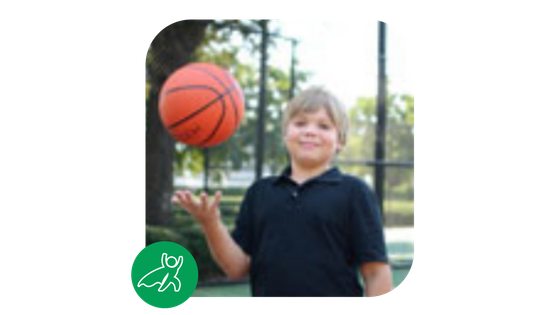Shriver and his mom from Dallas give an interview about his Perthes experience.
| Shriver: My name is Shriver and I am 10 years old. I want to be a Pediatric Orthopedic Surgeon like my doctor, Dr. Kim, when I grow up.
Mom, when did you know that Shriver had an issue with his hip? Shriver’s mom: I was watching my son at his first fall soccer practice and he was refusing to run. He had always loved sports and I had never seen him do anything like this and I reprimanded him for being rude to the coach. The next day he went to a water park and said he could not climb the stairs to the slides as it was too painful in his right leg. This was very unusual for our 7 year old. I took him to the pediatrician the next day and they assured me it was growing pains. However, I still had concerns and asked for x-rays anyway. The radiologist at a general hospital said they were normal, but I requested that an orthopedist see them who immediately saw that he had Perthes and referred us to TSRHC.
Shriver, what’s it been like growing up with Perthes disease? What restrictions has it placed on you? Shriver: Having Perthes is not fun. It stopped me from hanging out with my friends as much as I used to and from running around at recess. I could not play sports for almost 3 years. Sometimes I had to leave class to get medicine from the nurse. I am ready for it to be done.
Shriver’s mom: Nobody wants to see their child hurting and isolated. When feeling positive, I always tried to remember that it was not a life threatening illness. When feeling down I worried about what he was missing out on, and worried that he would be in chronic pain as a young adult after this was all finished. This fear made me very focused on following the physician’s treatment plan. I think one of the hardest parts is the length of the process and not knowing how much will have changed at each appointment. Sometimes there is no real change. He wants to know it will someday be over and so does the rest of the world, but I am aware that while It will “end”, we don’t know for sure what his outcome will be. How has the hospital staff helped you deal with the treatment? Shriver’s mom: The physicians and staff have been amazing at explaining things to all of us. They showed me the changes in his hip at each visit. They gave gentle reminders that it is a long road and ensured that our expectations were always realistic. My son loves to go to the visits there as the staff and volunteers make him feel like a cherished celebrity. I will forever be grateful for all that made him feel so at home and so valued. He describes it as happy place to go. What limitations did Perthes disease place on Shriver? How has his attitude about Perthes been?
All we want for him is to be able to enjoy his childhood and have a healthy hip into adulthood. Shriver, what kinds of stuff do you like to do now? What do you want to be when you grow up? Shriver: I love to play baseball now and be with my friends. I like to draw and be with animals. I love science and I am on the science and math teams. I want to be an orthopedic surgeon when I grow up and help kids. What can Shriver do now that he couldn’t do before? How has the hospital changed his life?
What is your understanding of Shriver’s prognosis? Shriver’s mom: My son’s hip is not the same as it would have been before Perthes. His leg is shorter from his osteotomy, the angles are different, and it is just not the same hip. His hip is still a good hip though. We will probably choose to avoid high impact activities, but he can play many sports and exercise for health. He will not sit in class in pain. He may need a hip replacement at an earlier age than my other son, but it will be much later than I first imagined. TSRHC has given us great care on living now, and protecting his hip for good living in his future. |

